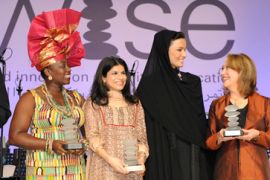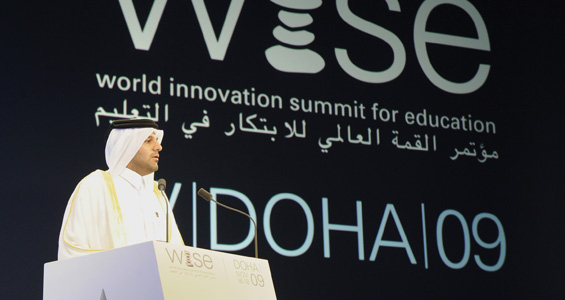Innovation tops Doha education meet
Leaders and academics draw up plan to provide greater access to education around the globe.

 |
| The summit was aimed at initiating the process of educational innovation, al-Thani said [WISE] |
The concept was ambitious from the start: invite 1,000 of the world’s leading policy-makers, academics and education experts to Doha, Qatar, and throw them into an intensive three-day summit with the task of finding innovative ways to address global educational inadequacies.
The result was just as ambitious, as participants from 120 countries agreed on a 10-point action plan to provide greater access to quality education around the globe at this week’s inaugural World Innovation Summit for Education (Wise).
The plan included a commitment to pursuing sustainable development and encouraging the involvement of local communities in providing education as part of the summit’s themes of pluralism, sustainability and innovation in education.
But organisers of the summit, which concluded on Wednesday, warned that the task of implementing those goals would not come quickly.
“This summit represents the beginning of a long-term process of innovation,” Abdulla bin Ali Al-Thani, the chairman of Wise and the vice-president of education for Qatar Foundation, said.
“Action springs from a focussed approach. We have been listening very closely to … the key concerns of the participants with a firm commitment to move from debate to concrete outcomes,” he said.
‘Threat’ to education
With debate that ranged from the benefits of using social networking as an educational tool to the need for investment in basic teacher training, organisers said they aimed to give everyone a platform to participate.
Despite the varied topics, the concept of using innovation to revamp the world’s educational systems was present throughout.
|
“[We must] acknowledge an intentional and premeditated threat to the right to an education” Sheikha Mozah bint Nasser Al-Missned |
Sheikha Mozah bint Nasser Al-Missned, the chair of Qatar Foundation for education, science and community development, said innovation should be at the heart of education, but she warned that the world must first acknowledge an “intentional and premeditated threat to the right to an education”.
“Our first step is to admit the seriousness of this imminent crisis we face. This summit requires us to debate deeply and discuss a series of issues at the core of the right to education,” she said, adding that innovation should be the focus of such debate.
“Normally when innovation is addressed, we accentuate the role of industry, technology and business sectors and I believe that this approach is both simple and naïve,” she said.
“Innovation should be … the force which exerts human energy and guides it wisely for the purpose of expanding human intelligence and creativity.”
‘Triumph of humanity’
As part of that approach, the summit included discussion on the role of technology and social networking tools to improve literacy, and increase access of information to more people around the world.
Summit speaker Biz Stone, the co-founder of Twitter, an online social networking, micro-blogging service, said the open exchange of information could have a positive global impact.
“When people are more informed, they become more engaged. And they become more empathetic to the plight of people around the world. That’s how we move forward,” he said.
He said things like Twitter are more than just technological advances, but tools designed to allow people to become more aware and involved in the world.
“Overwhelmingly, what people do with [Twitter] is good,” he said.
“So it doesn’t matter how sophisticated the algorithms get. We hope this will be a triumph of humanity, not a triumph of technology.”
Lack of access
But for millions of people around the world, the concept of using social networking tools is trumped by the lack of access to adequate basic education, some summit participants said.
| In video |
|
Irina Bokova, the head of Unesco, speaks to Al Jazeera |
“The economic and financial crisis has brought education sharply into focus. Education is a lifetime pursuit and an investment for the future.”
Katy Webley, the head of education for the humanitarian organisation, Save the Children, said her organisation has launched a five-year campaign to help with that investment by attempting to provide access to education to at least one million out-of-school kids, particularly in conflict-affected countries.
“Education is essential for instilling stability and normalcy, and replacing violence and fear with hope and purpose,” she said.
“One of the key challenges is massive under-investment in teacher training and compensation. Yet teacher quality matters more to student achievement than any other single factor.”
She called on world leaders to encourage an expansion of access, and plan and finance “equitable” education from the primary school level.
Educational challenges But David Arnold, the president of the American University in Cairo, said he has seen an increase in access to education in some regions, particularly in the Middle East.
However, he said an increase in educational facilities has not been accompanied by an improvement in the quality of education at such institutions.
“Gains over the past 20 years have been extraordinary in the Arab world regarding access. It’s a prerequisite,” he said.
“Now we’re in a position to go to the next level. What happens after they are in that institution? That is the challenge we’re facing now.”
It is one such challenge that Abdulla bin Ali Al-Thani, Wise’s chairman, identified as a goal to work toward solving.
“It is not enough to keep pace with these changes. We must turn our words into deeds,” he said.
“Humanity’s best hope lies in access to quality education.”